Exclusive | Asur 2 director Oni Sen: ‘I always tell my actors how to feel, rather than what to do’
In an exclusive conversation with OTTplay, director Oni Sen gets candid about all things Asur, the pressures of meeting expectations in Asur season 2, updates on Asur season 3, and more. Read on...
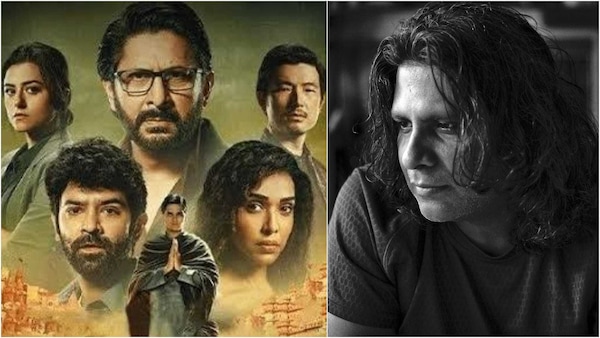
Last Updated: 02.21 PM, Aug 10, 2023
Much like a lot of viewers in the country, I discovered Oni Sen’s directorial web series Asur on OTT during the pandemic-imposed lockdown in 2020. Also, much like the others, I couldn’t wait to find out what happens in the next season! Three years later, it’s been about two months since the release of Asur Season 2 on Jio Cinema and yet, this psychological thriller, which is deeply seeped into mythology, is still among the top three OTT originals in India (source: Ormax Media).
OTTplay recently caught up with the director on a breezy afternoon and he spoke about all things Asur, the pressures of meeting expectations in Season 2, exploring the inner demons of seemingly righteous characters, intricacies of the human mind, updates on Asur Season 3, and more.
Edited excerpts from our freewheeling conversation below.
PS: Spoilers ahead! Tread with caution.
Q. Was Asur always intended to be a long-format show?
A. Asur was conceived by Gaurav Shukla, who’s the creator and writer of the show. And, in fact, he had conceived it as a film. This is much before he reached out to me many, many years back. Then, he turned it into a series and that’s when he reached out to me. I read it and I really liked it, and we started working on it.
Q. The first season of Asur came in 2020, and among the other shows that came on streaming that year were Panchayat, Paatal Lok, Aarya and Scam 1992 – all dabbling in different genres. And Asur came just a couple of weeks before the lockdown. It became a sleeper hit. Did you anticipate that it’s going to get the kind of appreciation it did when you started with the show?
A. The answer to this is slightly complex. To give you a simple answer - no, of course, we did not anticipate it. None of us anticipated it because it was, like you said, it was a sleeper hit. I think what I was very confident about, is the fact that it will be noticed for its uniqueness. And the uniqueness was very simple, because there was nothing that was made before that (Asur) that entwined the world of human drama, forensics and a bit of Indian mythology, in a very seamless manner. There was nothing that juxtaposed one over the other with that seamlessness, and while it still remained a very strong human story. I was quite confident that it would be noticed, but the fact that it will be so universally liked was a surprise. And it’s a very, very pleasant surprise!
Q. Usually, when the first season of a show becomes a huge success, there’s a humongous pressure to deliver more and go a step ahead in the second season. By the time people started talking about Asur and its concept, you guys were already filming the second season amidst the pandemic. Did the thought – to take the second season a notch higher ever occur at the back of your mind then, to increase that element of surprise, and did that also come to a point where you had to make certain changes in the script for the second season?
A. Yes. I think both Gaurav and I were very clear about the fact that when we are doing season two, we have to take it a few notches higher. Partially because, of course, the expectations of people. And secondly, also because it has to allow us to feel excited. Because it’s about putting in a couple of years of our life to do this. So keeping that in mind, Asur 2, from a writing level itself, was way more complex, and that entire scope of it was much wider.
Also what was quite challenging when we eventually were executing it, is the fact that in season two, we had invested in a lot more characters. In Season 1, we essentially had three characters – Dhananjay Rajput (Arshad Warsi), Nikhil Nair (Barun Sobti) and Shubh (Vishesh Bansal) – it was their story. But in season two, all the other characters besides these three, whether it’s Naina, whether it’s Nusrat Saeed (Riddhi Dogra), or Rasool Shaikh (Amey Wagh) – had their place in the Sun. To balance that, with the entire narrative structure and the number of events through the story at the same time, holding the tension and the balance between the human emotions, and the events was a task. So that’s why we were a little apprehensive before Season 2 was released. Will it be too different? Will those loyal (to the show) like it? These are all the fears that plagued us before it was released, because there was so much anticipation for Season 2. We were bombarded with messages day in and day out for a few years and some of them were really hilarious. It all came out of love. We were grateful it worked and the viewers liked it. I didn’t hear of any disappointment from them for season two.
Q. When we talk about the concept of Asur – there’s Shubh, who considers himself the modern-day avatar of Kali. From a very black-and-white perspective, he is the asur. But it’s very interesting how you’ve explored the inner demons of the so-called white characters - be it Arshad Warsi, Barun Sobti or Anupriya Goenka. How easy or difficult it is to play with these traits and incorporate them when you’re fleshing out a character on paper and to ensure that it gets translated in a meaningful way so that it doesn’t lose its essence.
A. Interesting! So, there are three parts to this. The first part is, of course, the intent and the writing. So intent-wise, if I just stepped back a little bit, what matters to me is the human story. I always feel that anything that we see, which could be the most amazing piece of events, those events are very momentary, they sort of amaze you for that moment. It doesn't stay on unless that human story stays on. That is what I tried to work very hard towards even in season one. Right from the beginning of season two, we were very clear that we’re going to explore the concept of Asur in all of us. It's not just the key characters, even if you see the climax, the common people, right? When this guy (Shubh) says that you can save yourselves or the little boy, who do you choose? Now the point is that, really, who do you choose?
Q. It’s a very interesting thing, because, in that moment, you’ll see that every single person, in a way, turns into an asur.
A. True! And the point is that at that moment, if you really ask yourself, if you forget all the Moral Science classes that you attended in school, and you ask yourself, what is correct? What is wrong? What is good? What is evil? Trust me, it’s not an easy answer to find at that moment. Our job here is not to tell people that hey, this is right or this is wrong, it’s just to open it up to talk about that. The human mind is probably the most complex thing ever made – more complex than anything. That is something we explored in all the characters at the writing level, which is what Gaurav and his team made sure that it was there for me to work on.
When we were shooting it and building it, the biggest challenge was you never shoot things linearly. For instance, on the first day, you might be shooting some climax scenes. Now, what I normally do is, for all my scenes, it’s very important to get the human feeling of the scene right. So, I always tell my actors what to feel, rather than what to do. And, in my head, I know what they should feel at that moment, what they should feel when they move out and move away from the scene. So, when I was talking to them, at that moment, in my head, I had to be very clear about what they were moving towards. It’s almost like a little meter. At that moment, are they going a little here? Or a little there? So, all those things, I had to explain to the characters so that it was very seamless for the editor and you don't feel that there is a jump. It’s very easy when you’re editing it through, to feel a jump in the character. Now, that jump will not happen if you have enough character motivation, right? So, those bits were planted.
If I just give you one example of Anupriya’s character – Naina. Now the point is, she really flips and goes on to the other side, right? But at the same time, at no point, can you turn around and say, ‘Hey, you're being evil? Are you being wrong?’ No. She is a wounded mother and a bitter woman who is really angry, and she believes that her husband could have saved their daughter. There’s this beautiful line, which she utters when she has a conversation with Nikhil (Barun), and Nikhil gets angry and says, “Woh meri bhi beti thi”, and she pauses and says, “Thi Nikhil, thi.” It’s not ‘hai’ anymore. Her lips quiver at that moment, and she dies a thousand deaths to talk about their dead daughter. Now, the point is that these are the moments that make the character flip between all these little orbital things and take different colours and shades. I think that’s the most magical part.
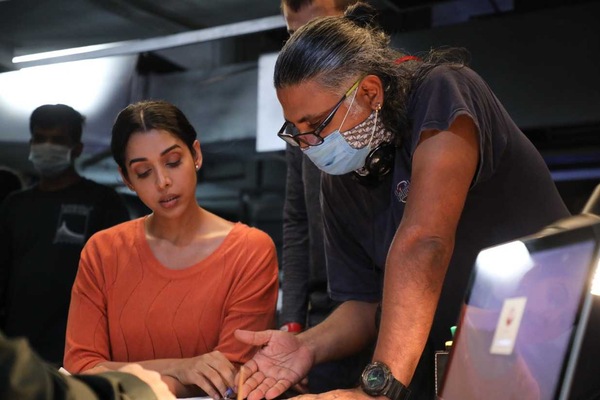
Q. Let’s talk a bit about your shooting experience in Banaras (Varanasi), because it’s not at all like other cities. If you go on the ghats, you will find a pundit taking a dip in the water and at the same time you will also find a Muslim man playing a flute. It’s like an interesting confluence of different religions, cultures, and people. What was it like for you?
A. So, the thing is that before I started (shooting Asur), I’d never been to Banaras. I always wanted to, because I grew up in Calcutta. In a lot of literature in Calcutta (Kolkata), there are references to Banaras. And, of course, we’ve grown up watching (Satyajit) Ray films and Ray had a love for Banaras (as is shown) in a couple of his films, and therefore, Banaras is a place which I really wanted to go to.
I’ve read and read a lot about Banaras. There was a script I was working on, which was set in Banaras but I was writing it without going to Banaras. It was ironic, but because of Asur, that was the first time I went there. And I think it took me a few minutes on the ghat, just to get amazed. I don't think there’s anything specific. I think there’s an aura of that place that is beyond anything that you see, physically feel, or smell. And I don’t know whether I want to point it out to one specific thing like people are bathing and there are dead bodies… I don’t think there’s anything as simple as that. I think it’s way beyond that. It’s not a city, it’s an experience and I think that’s what happened to me.
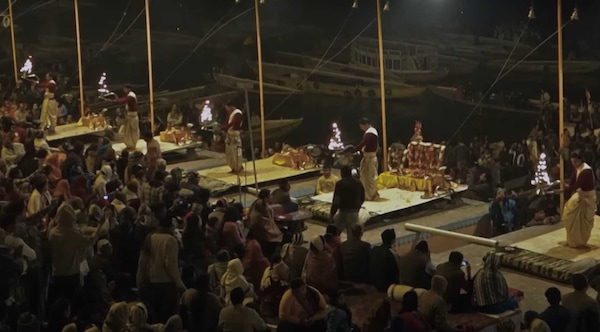
Beyond the times I used to recce through the spaces, I used to spend the rest of the time just walking from one ghat to the other, then up into the neighbourhood and the food, I love the food there. And the kachoris and the jalebis – I used to feast on that. Just to sit there and look at people, and talk to some of them. And there are so many different kinds of people.
Q. And everybody has a story to tell…
A. Everybody has a story to tell and you can actually make a film on each of those stories which is so amazing. I also felt that on the whole, people on the street, and people at the chai gallas were very cordial and very open to just chatting. I’ve been to Banaras, twice in two segments. One is pre-COVID – life is all about pre-COVID and post-COVID now – so post-COVID as well. It was truly, truly amazing. That city, of course, it’s chaotic, of course, a lot could be done. I had little issues with some of the beautification that is being done, which is not necessarily the most amazing, but it’s okay, I guess, it’s subjective. In fact, there’s another project that I’m working on after this, most of which is set in Banaras because I feel that I haven't explored it enough. So, I would love to spend more time in Banaras!
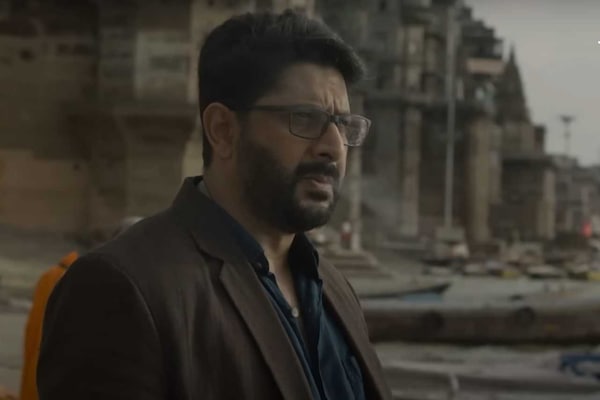
Q. You’ve also done Out of Love (on Hotstar) earlier which is very much about the intricacies and complexities of human relationships. There are also a lot of moral dilemmas in that show and then you surprise everybody by making an Asur. Out of the two, which is the space that you personally enjoy more?
A. Both. The reason I’m saying both, and maybe more, is that anything that allows me to deal with, or delve into the human mind. So apart from these two, there’s another project of mine, which is a documentary feature, which is called The Saints of Sin. It deals with the story of eight women. They talk about their lives and what they’ve been through. Some of it is euphoric, some of it is extremely dark. That is something that I’ve worked on for three years. It’s a 90-minute film and I even enjoyed doing it.
My entire thing is that you give me a human being to work with... I mean, not in a medical way (chuckles). Just give me a human being to work with and I’m excited because if I don’t have a human being I don't know what to do. If I don’t have the emotions to work with, the subtext to work with, it’s very difficult. There are some scenes, which I love doing, whether it’s Out of Love or Asur. These are scenes where two people are communicating - there are very few words, and I think those are such beautiful scenes. They can challenge you and once you crossover and manage to get those right, they are beautiful. So, human beings and human minds are what I would love to continue working with.
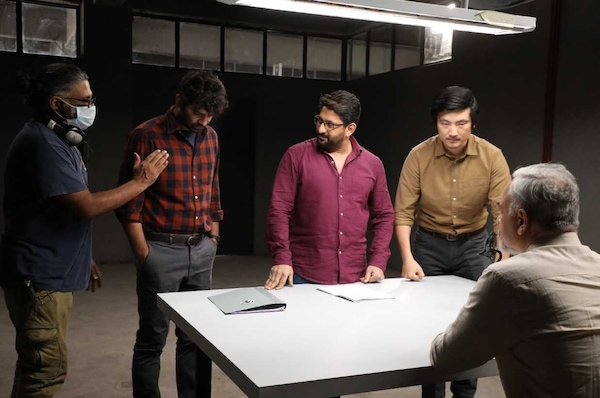
Q. What kind of shows do you personally enjoy watching?
A. All kinds. Panchayat is one show I loved watching. The other ones which I loved were Ted Lasso and Mindhunter. Anything that transcends from exciting events to a walkthrough of human minds and human emotions, I love watching those. The shows where seemingly nothing is happening, but there’s a lot happening. I like watching things where I can watch with patience and there doesn't have to be an adrenaline rush.
Q. Now, it would be unfair if we don’t ask you about the next season of Asur. You’ve already mentioned that you are in discussions with Gaurav about the third season, but I believe nothing has been finalised yet. What I’d like to know is whether the third season will be a continuation of the same story or would you pick up a new story dealing with a similar space but different characters?
A. From what my understanding is, if and when it happens, it will be an extension of the story in a way that it will be seriously exciting, and that is something which I think Gaurav hasn’t cracked the code as yet. So, once he manages to crack the code, I think we will discuss it. So as of now, Gaurav has told me that, “Sir, once I crack it, I’ll call you.” So, we’re not in a hurry.

